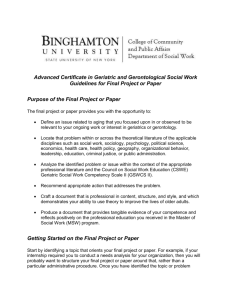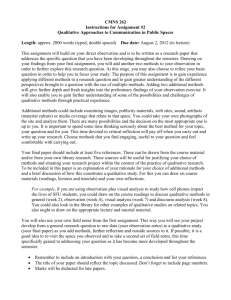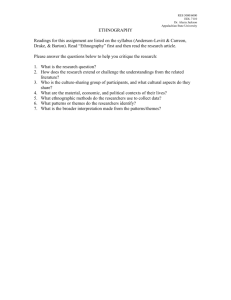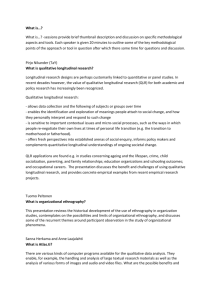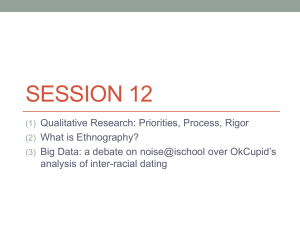Dixson - SP 10 - The Ohio State University
advertisement
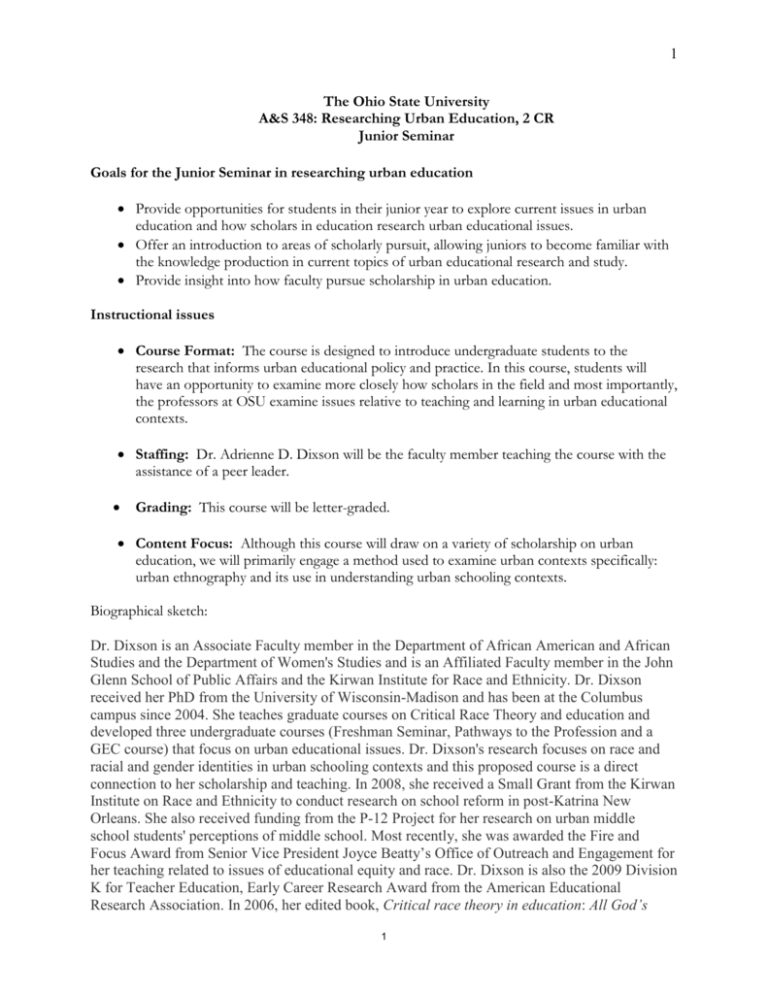
1 The Ohio State University A&S 348: Researching Urban Education, 2 CR Junior Seminar Goals for the Junior Seminar in researching urban education Provide opportunities for students in their junior year to explore current issues in urban education and how scholars in education research urban educational issues. Offer an introduction to areas of scholarly pursuit, allowing juniors to become familiar with the knowledge production in current topics of urban educational research and study. Provide insight into how faculty pursue scholarship in urban education. Instructional issues Course Format: The course is designed to introduce undergraduate students to the research that informs urban educational policy and practice. In this course, students will have an opportunity to examine more closely how scholars in the field and most importantly, the professors at OSU examine issues relative to teaching and learning in urban educational contexts. Staffing: Dr. Adrienne D. Dixson will be the faculty member teaching the course with the assistance of a peer leader. Grading: This course will be letter-graded. Content Focus: Although this course will draw on a variety of scholarship on urban education, we will primarily engage a method used to examine urban contexts specifically: urban ethnography and its use in understanding urban schooling contexts. Biographical sketch: Dr. Dixson is an Associate Faculty member in the Department of African American and African Studies and the Department of Women's Studies and is an Affiliated Faculty member in the John Glenn School of Public Affairs and the Kirwan Institute for Race and Ethnicity. Dr. Dixson received her PhD from the University of Wisconsin-Madison and has been at the Columbus campus since 2004. She teaches graduate courses on Critical Race Theory and education and developed three undergraduate courses (Freshman Seminar, Pathways to the Profession and a GEC course) that focus on urban educational issues. Dr. Dixson's research focuses on race and racial and gender identities in urban schooling contexts and this proposed course is a direct connection to her scholarship and teaching. In 2008, she received a Small Grant from the Kirwan Institute on Race and Ethnicity to conduct research on school reform in post-Katrina New Orleans. She also received funding from the P-12 Project for her research on urban middle school students' perceptions of middle school. Most recently, she was awarded the Fire and Focus Award from Senior Vice President Joyce Beatty’s Office of Outreach and Engagement for her teaching related to issues of educational equity and race. Dr. Dixson is also the 2009 Division K for Teacher Education, Early Career Research Award from the American Educational Research Association. In 2006, her edited book, Critical race theory in education: All God’s 1 2 children got a song (RoutledgeFalmer Press) was awarded the Critics’ Choice Award by the American Educational Studies Association. A & S 348: Research in Urban Teaching and Learning, 2 Credits Winter Quarter 2010, Thurdays, 10:30-12:48pm Arps Hall, Room 269 Instructor: Adrienne D. Dixson Office: Arps Hall Office hours: Thursdays, 1-2:30pm Office phone: 247.8461 e-mail: dixson.1@osu.edu Faculty Coordinator: Adrienne D. Dixson, PhD Goals for the Junior Seminar in researching urban education Provide opportunities for students in their junior year to explore current issues in urban education and how scholars in education research urban educational issues. Offer an introduction to areas of scholarly pursuit, allowing juniors to become familiar with the knowledge production in current topics of urban educational research and study. Provide insight into how faculty pursue scholarship in urban education. Instructional issues Course Format: The course is designed to introduce undergraduate students to the research that informs urban educational policy and practice. In this course, students will have an opportunity to examine more closely how scholars in the field and most importantly, the professors at OSU examine issues relative to teaching and learning in urban educational contexts. Staffing: Dr. Adrienne D. Dixson will be the faculty member teaching the course with the assistance of a peer leader. Grading: This course will be letter-graded. Content Focus: Although this course will draw on a variety of scholarship on urban education, we will primarily engage a method used to examine urban contexts specifically: urban ethnography and its use in understanding urban schooling contexts. Course Description: Students enrolled in Research in Urban Teaching and Learning will have an opportunity to explore the research that informs urban educational teaching and learning. The course work 2 3 component will introduce students to the interdisciplinary field of urban education through an examination of both empirical and theoretical literature that informs policy, pedagogy and learning. While we will read a diverse body of scholarship, we will pay particular attention to how scholars, both educational anthropologists and educational sociologists have used urban ethnography as a research methodology to examine educational issues in urban schooling contexts. The students will read original research by the course instructor as well have the opportunity to engage in their own small scale study of urban educational issues. We will pay particular attention to the ways in which scholars have examined educational equity issues as they pertain to race, class, gender, sexual orientation and ability. Course Goals: 1. Students will develop an informed and nuanced understanding of the complexities of teaching in urban schools. 2. Students will understand the complex relationship between historical, social, political and economic factors and urban education. 3. Students will develop an understanding of the relationship between multiple factors, e.g., race, class, gender, native language, and teaching and learning in urban schools. 4. Students will develop basic research skills and apply them to urban educational issues. Texts Required 1. Lareau, A. & Shultz, J. (1996). Journeys through ethnography: Realistic accounts of fieldwork. Boulder: Westview Press. 2. Writing Up Qualitative Research (Qualitative Research Methods) by Harry F. Wolcott (On Reserve in Thompson Library) 3. Analyzing Social Settings: A Guide to Qualitative Observation and Analysis by John Lofland, David A. Snow, Leon Anderson, Lyn H. Lofland (On Reserve in Thompson Library) 4. Writing Ethnographic Fieldnotes (Chicago Guides to Writing, Editing, and Publishing) by Robert M. Emerson (On Reserve in Thompson Library) 5. Qualitative Analysis for Social Scientists by Anselm L. Strauss (On Reserve in Thompson Library) 6. Selected journal articles. You must retrieve selected journal articles from The Ohio State University Library. Select one: 7. Ladson-Billings, G.J. (2009). DreamKeepers: Successful teachers of African American students. San Francisco: Jossey-Bass. 8. Lee, S. (2008). Unraveling the “model minority” stereotype: Listening to Asian American youth. 2nd Edition. New York: Teachers College Press. 9. Lewis, A. E. (2003). Race in the Schoolyard: Negotiating the Color Line in Classrooms and Communities 3 4 10. MacLeod, J. (1995). Ain’t no making it: Attainment and aspirations. Expanded edition. Boulder: Westview Press. 11. Suarez-Orozco, C. & Suarez-Orozco, M. (2002). Children of immigration (The Developing Child). Cambridge, MA: Harvard University Press. Course Policies Attendance. The seminar format of the class is designed to promote substantive engagement with the course materials and a meaningful, collaborative learning environment through discussion and dialogue. Thus, it is important that students attend class regularly, arrive on time prepared to contribute to and participate in class. It is imperative that students complete all readings prior to our meetings. Missing more than one class meeting with adversely affect your grade. Two unexcused absences will lower your grade by one letter grade. Three unexcused absences is an automatic failure of the course. Technology: We will use Carmen to extend our discussions on urban teaching and learning. I require that you participate in all Discussion Forums and you are required to post a comment and respond to someone else’s post at least twice a week. Participation in the Carmen Discussion Forums is 10% of your overall participation grade. Important formatting and submission information: All written assignments must be submitted via Carmen. All written assignments must be wordprocessed and double-spaced using Times/New Roman, 12-point font with 1” margins all around the page. Please insert page numbers in the upper right hand corner of the page. We use the American Psychology Association style manual, 5th edition for citations and formatting papers. Grading. Students will earn credit for this course through their active participation in class discussions, written assignments, presentations in-class writing and speaking assignments and off-campus field experience. A 94-100 A- 93-90 C 76-74 D 66-64 B+ 89-87 B 86-84 C-73-70 D-63-60 B- 83-80 C+ 79-77 D+ 69-67 E 59 Assignment Class participation Due Date Weekly Reading response journal Research project Final presentation Total points See syllabus TBD TBD Points 20 (in-class speaking and writing activities) 30 30 20 100 4 5 Class Participation (20 pts): To be successful in this course, active participation through discussion and dialogue with peers and the professor is vital. The professor expects all students to come prepared to engage in class discussions by having thoroughly and actively read and/or prepared your journals prior to class. Students will also demonstrate active participation in the course by completing impromptu writing exercises relevant to the week’s reading. During the data collection portion of the course, we will not meet as a whole class. I will set up bi-weekly meetings to meet with individual research groups to discuss your experiences in the field and answer any methodological questions you might have. On the days that we do not meet as a group, you will respond to discussion questions I post to Carmen and/or participate in live chats. Response Journal (30 pts): Each student is required to keep a journal of her/his responses to the weekly readings and field experience. 3 times during the quarter (see calendar for due dates), students will submit their journals via Carmen. Entries should be 3-5 pages in length. Students must demonstrate a careful examination of the week’s texts through thoughtful and coherent writing. The journal responses should briefly address all of the following questions with regard to one of the assigned texts for that week (Consult assignment schedule to determine which text): 1. What is the author’s main argument/s? (What themes did it address?) 2. What ideas or discussions about urban education is the author addressing, building upon and/or critiquing? What new ideas about urban education did the author present? 3. What research methods did the author use? 4. How did the text help you make sense of what you are learning about urban teaching and learning? Research project (30 pts.): For this assignment, you and two others (based on the book you select to read) will design a research project on an urban educational issue. For this particular assignment, you will primarily be limited to using ethnographic methods and specifically, participant observation. We will work as a class on obtaining approval from the Institutional Review Board and you will have to take the online training on human subjects research. We will discuss this process in more depth in class. For the purposes of this assignment, you are to design a project that allows you to both understand an urban educational issue, but more importantly understand how scholars engage in researching urban educational issues. By Week Three of the quarter, you and your team members will have to agree upon an issue that you want to explore. Depending on the scope of your project and your research questions, you will have 3-4 weeks for data collection and analysis. We will negotiate research sites as I have quite a few contacts in Columbus City Schools as well as charter schools in the area. Part of your grade will be based on the quality of your field notes, your research journal and the overall execution of your research project. I am not expecting you to be perfect but to demonstrate that you are seriously engaging in the process of research on an urban educational issue. You submit copies of your field notes and research journals on the days that I meet with your group. Final Presentation of research project (20 pts.): The presentation gives you an opportunity to share what you have learned in your brief research project on an urban educational issue. You are not required to prepare a Powerpoint presentation, but you must have some sort of visual aid for your presentation. You are welcome to use audiovisual data but I encourage you to be as creative as possible in presenting your data. You must 5 6 also have a 1-2 page handout to accompany your presentation that explains your project and findings. You will have 15-20 minutes for your presentation. Statement of Student Rights: Any student with a documented disability who may require special accommodations should selfidentify to the instructor as early in the quarter as possible to receive effective and timely accommodations. Students who wish to have an accommodation for disability are responsible for contacting the professor as soon as possible. The Office for Disability Services (150 Pomerene Hall; 292-3307; 292-0901 TDD) verifies the need for accommodations and assists in the development of accommodation strategies. Statement of Academic Misconduct: Any student found to have engaged in academic misconduct while within the university’s jurisdiction, as set forth in section 3335-23-02, will be subject to disciplinary action by the university. See your student handbook for further information on academic dishonesty and the accompanying procedures and penalties. Weekly Schedule Week 1: Introductions, discussion of syllabus, selection of individual books and demonstration of CITI training course. Week 2: Diverse perspectives on research in education Readings: Blair, M. (2004). The myth of neutrality in educational research. In Gloria Ladson-Billings and David Gillborn, Editors. The RoutledgeFalmer Reader in Multicultural Education. London, UK: RoutledgeFalmer Publishers, pp. 243-251. Lee, C.D., Spencer, M.B., Harpalani, V. (2003). “Every Shut Eye Ain’t Sleep”: Studying How People Live Culturally. Educational Researcher, 32(5), 6-13. Ladson-Billings, G.J. (2003). It’s your world, I’m just trying to explain it: Understanding our epistemological and methodological challenges. Qualitative Inquiry, 9(1), pp. 5-12. Book groups/research teams meet (in class) Week 3: What is urban ethnography? Readings: Lareau and Shultz, pp. 237-240. Mattson, Greggor (2007). Urban Ethnography’s ‘Saloon Problem’ and its Challenge to Public Sociology. City & Community, 6(2), 75-94. 6 7 Suttles, G.D. (1976). Urban Ethnography: Situational and Normative Accounts. Annual Review of Sociology, 2, 1-18. Wacquant, L. (2002). Scrutinizing the Street: Poverty, Morality, and the Pitfalls of Urban Ethnography. American Journal of Sociology, 107(6), 1468-1532. Book groups/research teams meet (in class) Due: Response journal #1. Week 4: Tales from the field Readings: Lareau and Shultz, pp. 1-74 Book groups/research teams meet (in class) Week 5: Tales from the field, pt. 2. Readings: Lareau and Shultz, pp. 75-148. Book groups/research teams meet (in class) Week 6: Readings: Emerson, Writing Ethnographic Fieldnotes, p. 1-35; 100-104 Lareau and Shultz, pp. 149-236 Due: Response journal #2 Book groups/research teams meet (in class) Week 7: Data Collection. No whole class meeting. Research teams meet with Dr. Dixson Strauss, A. Qualitative Analysis for Social Scientists, read, pp. 109-150 Week 8: Data Collection. No whole class meetings. Research teams meet with Dr. Dixson Readings: Lofland, et. al., Analyzing Social Settings: A Guide to Qualitative Observation and Analysis, skim, chps. 9-10. 7 8 Strauss, A. Qualitative Analysis for Social Scientists, read, pp. 1-104 Week 9: Dixson Data Collection. No whole class meetings. Research teams meet with Dr. Readings: Emerson, Writing Ethnographic Fieldnotes, p. 39-65 Strauss, A., Qualitative Analysis for Social Scientists, 258-264. Walcott, Writing Up Qualitative Research, pp. 13-42 Due: Response journal #3. Week 10: Final presentations Week 11 Final presentations 8


